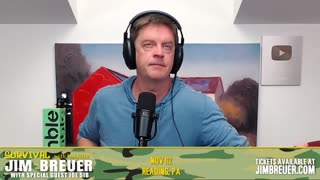Prof. Rob Jenkins
Professor Rob Jenkins, an English professor with a rich 38-year tenure in academia at Georgia State University, shares insights shaped by his experiences across various roles in higher education, including as an administrator and college basketball coach. Jenkins's journey reflects a critical engagement with the challenges and transformations within academia and society, especially in the face of the COVID-19 pandemic and the evolving landscape of higher education.
Jenkins articulated a nuanced skepticism about the pandemic's governmental responses, suggesting an overblown reaction that spurred him to advocate for the reopening of society. He critically observes, "from the very beginning seemed to me to be overblown... I began advocating for reopening society, reopening schools, reopening universities."
Reflecting on the broader implications of administrative dominance in academia, Jenkins laments the erosion of professorial influence, highlighting the shift towards a bureaucratic model that prioritizes administrative objectives over educational and academic values. He critiques the rise of credentialism, noting, "the administrative class... run things. The professors are no longer in charge," pointing out the imbalance this creates within the academic institutions.
Jenkins's discourse extends to the societal penchant for security over liberty, warning against the historical and ongoing use of fear by governments to control populations. He draws parallels with his observations on COVID-19, stating, "governments have to control their population. And the easiest way to control people is through fear."
Moreover, Jenkins's dedication to fostering critical discourse led him to contribute to the Brownstone Institute, emphasizing the importance of platforms that challenge prevailing narratives. This reflects his commitment to truth, stating, "I really wanted to write for Brownstone... I admired the people who were writing for them."
His critique of politicized science, particularly around pandemic policies, underscores a broader concern with the selective use of scientific evidence for political ends. Jenkins contends, "closing the schools is another issue. It was obvious to me that that wasn't necessary. So why were we doing it? Because we were playing politics with this virus."
Addressing the consequences of lockdown measures, Jenkins highlights the disproportionate impact on students and young people, acknowledging the "real loss" and challenges faced by this demographic, thereby emphasizing the need for a balanced approach to public health crises. Jenkins also reflects on the personal and professional growth prompted by the pandemic, including the forced adaptation to online teaching. He notes a shift in his stance towards online education, recognizing its potential benefits and applicability under certain conditions.
In discussing the trajectory of political systems towards authoritarian models, Jenkins posits, "all modern political systems basically devolve into fascism," warning of the dangers inherent in unchecked governmental power and the erosion of individual freedoms. Finally, Jenkins's thoughts on the enduring struggle between individual liberty and societal security resonate as a call to critically evaluate the trade-offs inherent in governance and policy-making. He asserts the importance of maintaining a vigilant stance against the encroachment of authoritarian tendencies, underscoring the value of freedom and the role of education in cultivating a society capable of navigating these complex dynamics.
Professor Robin Jenkins' reflections offer a critical lens on the interplay between politics, education, and societal values. His experiences and writings advocate for a society that values truth, liberty, and the importance of challenging authority for the betterment of all.
-
 7:41
7:41
China Uncensored
17 hours ago100,000 EVACUATED During Massive China Floods
47.4K36 -
 10:45
10:45
TENET Media
17 hours agoAI Hoax Hate: Man Frames School Principal with Fake Racist Recording | Matt Christiansen
48.9K27 -
 28:31
28:31
Brewzle
1 day ago24 Hours At A Memphis Whiskey Distillery | Old Dominick
34.9K4 -
 19:27
19:27
Precision Rifle Network
1 day agoBrake VS. Silencer - Federal Vs. Norma
28.1K6 -
 1:47:57
1:47:57
UnchartedX
1 day agoUnchartedX LiveStream: My Thoughts on the JRE Debate, and Egypt Trip Review continued!
38.5K37 -
 2:18:33
2:18:33
Jewels Jones Live
1 day agoLAURA LOOMER | A Political Rendezvous – Ep. 74
50.8K31 -
 1:12:24
1:12:24
Jim Breuer
5 days agoThe Breuniverse Episode 132 | Antonio Sabato Jr.
117K107 -
 2:39:32
2:39:32
Roseanne Barr
1 day agoNightcap at the Plaza with Tyler Fischer | The Roseanne Barr Podcast #45
172K444 -
 1:05:04
1:05:04
Russell Brand
1 day ago“There’s NOTHING Left!” 600,000 Ukrainians DEAD! | Colonel Douglas Macgregor On The Ukraine War
369K1.38K -
 5:44:25
5:44:25
Real Coffee With Scott Adams
17 hours agoEpisode 2457 CWSA 04/27/24
49.2K36